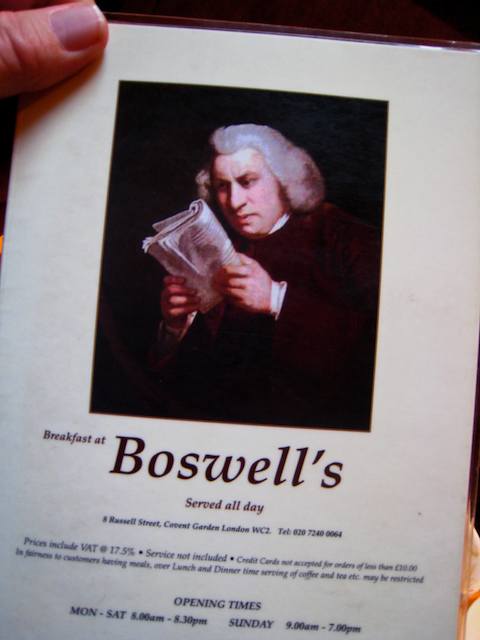
Thanks to Andrew for the link.


Thanks to Andrew for the link.
Bill Thompson on The importance of being there…
On Monday I went to see author and thinker Clay Shirky talk at a lunchtime seminar hosted by the Demos think tank.
I travelled in to London earlier than I needed to on a crowded train, sitting on a slow bus across town and then squeezing into a bright but too warm room to sit on a hard seat in order to listen to something which was being recorded and will later be available as a podcast.
Clay was charming and intelligent and funny, and I got to hear him thinking out loud about the impact of social tools on international politics, which was fun, but I could have done all that by listening in online, or even by watching the stream of brief reports appearing on Twitter, the communications service that is currently taking the net by storm…
Well, maybe…
Viacom has “backed off” from demands to divulge the viewing habits of every user who has ever watched a video on YouTube, the website has claimed.
Google had been ordered to provide personal details of millions of YouTube users to help Viacom prepare its case on alleged copyright infringement…
En passant, I think I heard Mike Wesch say in his Manitoba lecture that a suvery he and his students did found that 88% of the stuff on YouTube is original material — i.e. not copyright-infringing.

We went to a ravishing production of La Nozze di Figaro in the Royal Opera House on Saturday evening and had supper beforehand in Boswell’s at 8 Russell Street. Fans of Samuel Johnson will recognise the address. It was built in 1759-60 and owned by Thomas Davies, an actor turned bookseller and publisher and, by all accounts, a very hospitable soul. At 7pm on May 16, 1763 he was giving tea to a young reprobate named James Boswell when who should walk in but Dr. Johnson. Boswell was apprehensive about meeting the great man because he knew that he disapproved of the Scots, and so begged Davies not to mention his nationality. His host either did not hear the request, or mischeviously ignored it. Either way, the fact that Boswell was Scottish (or Scotch, as Dr. Johnson would have said) was mentioned. Boswell said defensively that he “could not help it”. “That, Sir”, boomed Johnson, “is what I find a great many of your countrymen cannot help”. (He also famously observed that “The fairest prospect for a Scotchman is the high road to England”.)
Not an auspicious beginning, you’ll admit; but still it led to one of the greatest collaborations in English literature.
Here’s a rare sighting of a public man behaving honourably.
Mervyn King, the Governor of the Bank of England, has turned down a pay rise of around £100,000 because he did not feel it was appropriate in the current economic climate.
Mr King rejected the near-40pc pay rise to £400,000 when he was reappointed as Bank of England Governor this summer, according to the Bank’s annual report.
It is thought he did so fearing that an above-inflation pay increase might prompt workers to demand higher salaries.
One of the things that dismays me is the pathological bureaucratisation of some of the organisations with which I have to deal, so this perceptive observation by Clay Shirky struck a chord.
Process is the feature creep of organizations. In the same way software has to have features, groups have to have process. But like software, process creep in groups is insidious — each additional check in or form seems to cost little and add much, but over time, the cumulative overhead of process can hamstring an organization, almost without their noticing.
Six or seven years ago, ATT asked me to spend some time helping them figure out their web hosting offerings, and after some preliminary work, it became clear that there would be no mainstream hosting business, because the cost to the customer would be too high to be competitive. This was not because ATT was buying expensive hardware; it was because their minimum hosting processes imagined layers and layers of dev, stage, and live servers, and a complex array of user management interfaces. When ATT asked how the existing hosting companies could provide their services so cheaply, I said that the competition was simply offering shell access, and that people could FTP anything they liked to the server or telnet in and write stuff directly on a live box.
ATT was aghast, of course, at such laxity, but in fact, it was this kind of simple, process-lite attitude that helped the net spread generally, and it was ATT’s “Quality of Service” attitude that marginalized them.
This is many stories, of course, hundreds of stories, thousands of stories. It’s why Berners-Lee succeeded while Nelson failed, it’s why markets work better than central planning, because central planning is process made supreme, and it’s even why Open Source works though it has less process than commercial firms. This is not to say that there is not a process to Open Source efforts, but rather that it is considerably simpler than the process adopted by Serious Commercial Software Firms®, who for years misunderstood Open Source, because they assumed no one could build software with that little process.
How things change. This from today’s NYTimes.com…
SAN FRANCISCO — The golden era of the small seller on eBay, hawking gewgaws and knickknacks from the basement or garage, is coming to a noisy and ignominious end.
Consumers appear to be tiring of online auctions, and rivals like Amazon.com are attracting more shoppers with fixed-price listings, while eBay has been struggling for growth. To shift toward that model, eBay has struck a deal with the Web retailer Buy.com that allows the company to sell millions of books, DVDs, electronics and other items on eBay without paying the full complement of eBay fees.
The recent change is one of several under eBay’s new chief, John Donahoe, that is stirring rancor among the faithful who depend on the site for their livelihood. The deal with Buy.com has added over five million fixed-price listings to eBay.com since the beginning of the year — for items from Xbox 360 video game consoles to Weber grills.
Since eBay’s search listings favor larger sellers who can add perks like free shipping, which improve their feedback ratings, Buy.com’s presence has hurt many smaller sellers that compete in those product categories.
EBay is signaling that its future lies with big, reliable sellers, not the mom and pop shops that are objecting so vociferously to the Buy.com deal, said Tim Boyd, an Internet analyst with American Technology Research. “It’s a tragic ending to what was once a warm and fuzzy Silicon Valley story,” he said…
Er, can your iPod do this?
… is talking at Demos tomorrow.

I’m not overly impressed by most of the Apps currently on offer in the iTunes store, but FileMagnet is an exception. It makes it easy to transfer files from Mac to iTouch using WiFi. Works only for Macs running Leopard. Really neat; and useful already.
(Thanks to Kevin Cryan for spotting that the link as originally provided was duff.)